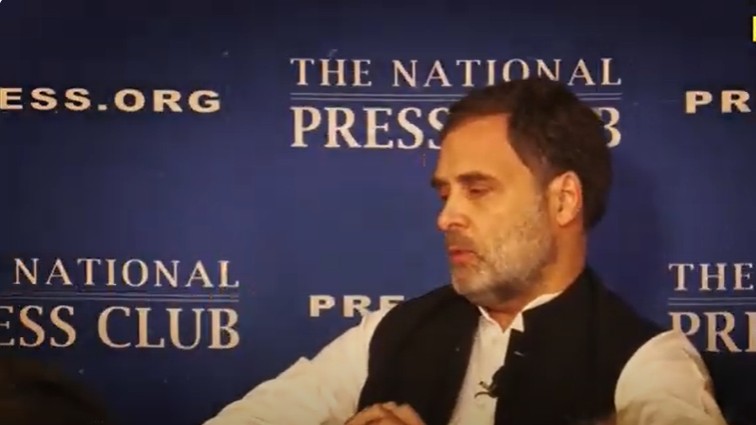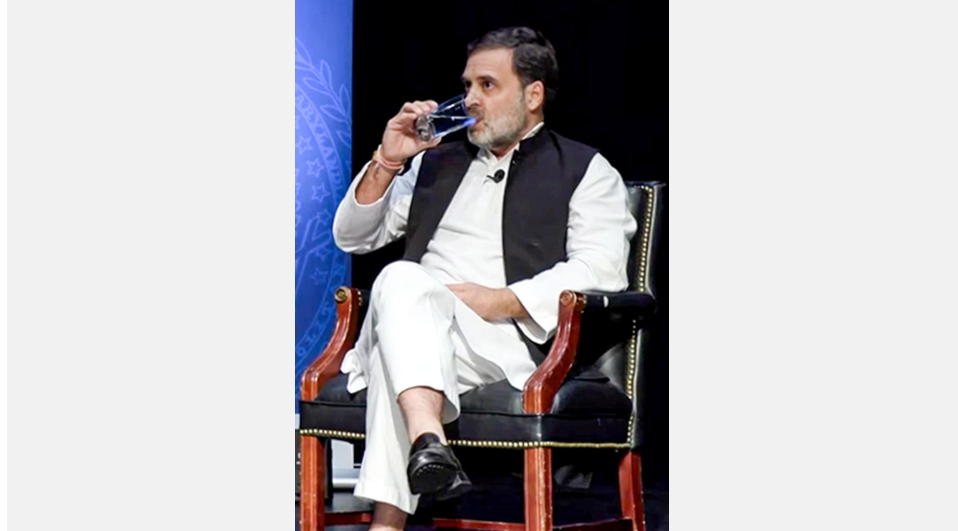U.S. Speech Congress leader Rahul Gandhi’s recent speech during his tour of the United States has sparked a significant political storm in India, particularly his remarks against the Rashtriya Swayamsevak Sangh (RSS). His scathing critique of the RSS, which he accused of undermining democratic institutions and promoting divisive ideologies, has stirred fierce debates both domestically and abroad. The speech, delivered during a public interaction with Indian-American communities and intellectuals, has drawn sharp responses from the ruling Bharatiya Janata Party (BJP) and its allies, while it has garnered praise from opposition leaders who view Gandhi’s stance as courageous and necessary for India’s democratic fabric.
In this article, we will explore the content of Rahul Gandhi’s U.S. speech, the political reactions it has evoked in India, the history and role of the RSS in Indian politics, and the broader implications of Gandhi’s remarks for the country’s political landscape.
U.S. Speech Rahul Gandhi’s Criticism of the RSS
During his U.S. speech, Rahul Gandhi delivered a pointed critique of the RSS, portraying the organization as a threat to India’s democratic institutions and secular values. According to Gandhi, the RSS, a right-wing Hindu nationalist organization, exercises disproportionate influence over the ruling BJP and has been responsible for steering India toward authoritarianism and religious polarization. He accused the RSS of attempting to reshape India’s identity, which he argued should be inclusive and pluralistic, into one that is intolerant of diversity.
In his speech, Gandhi said, “The RSS is trying to impose an ideology on India that goes against the very fabric of what our country stands for. It’s an ideology that promotes a hierarchical and divisive society, where a few people at the top dictate terms to everyone else.” He went on to describe the RSS as an organization with a “fascist” mindset, accusing it of working behind the scenes to erode India’s democratic institutions, weaken checks and balances, and suppress dissent.
These comments, particularly his use of the term “fascist,” drew widespread attention and triggered strong reactions from supporters of the RSS and the BJP. Gandhi’s remarks were viewed as part of a broader strategy to build a narrative around the defense of democracy, secularism, and pluralism, key tenets that have traditionally been championed by the Indian National Congress.
U.S. Speech Political Reactions in India
The backlash from the BJP and its allies was swift. Top BJP leaders condemned Rahul Gandhi’s remarks, accusing him of maligning India’s image on foreign soil and acting against the national interest. Union Minister for Information and Broadcasting Anurag Thakur lashed out at Gandhi, U.S. Speech stating, “Rahul Gandhi has once again shown that he has no respect for India’s democratic institutions and its people. His comments about the RSS are not only baseless but are an insult to the millions of Indians who support the organization.”
BJP spokesperson Sambit Patra labeled Gandhi’s remarks as “irresponsible,” accusing him of using foreign platforms to “denigrate India’s cultural and political ethos.” Patra further asserted, “It is Rahul Gandhi who is out of touch with reality. The RSS has been at the forefront of nation-building, U.S. Speech promoting self-reliance, and fostering unity among Indians. Gandhi’s attacks on the RSS are nothing but political desperation.”
On the other hand, several opposition leaders rallied behind Rahul Gandhi, praising his boldness in taking on the RSS and the BJP. Congress leader Jairam Ramesh defended Gandhi’s remarks, U.S. Speech stating that the Congress party has always stood for protecting India’s democracy and secularism from the RSS’s influence. “Rahul Gandhi has spoken the truth. The RSS and BJP are systematically dismantling the democratic institutions that have kept India united for decades. It is time for the people to realize the threat that these forces pose to our country,” Ramesh said.
Leaders from other opposition parties, including the Trinamool Congress (TMC) and the Communist Party of India (Marxist), also expressed support for Gandhi’s stance. TMC leader Mahua Moitra remarked, “Rahul Gandhi’s speech in the U.S. has brought to light the growing authoritarianism under the BJP regime. The RSS is the ideological backbone of this regime, U.S. Speech and it is imperative to counter their influence if we are to safeguard our democracy.”
U.S. Speech Role of the RSS in Indian Politics
To understand the political storm that Rahul Gandhi’s speech has triggered, it is important to examine the historical and ideological role of the RSS in Indian politics. Founded in 1925 by K.B. Hedgewar, the RSS is a Hindu nationalist organization that envisions India as a Hindu Rashtra (Hindu nation). The organization’s activities span social, cultural, and political domains, U.S. Speech with a focus on promoting Hindu values, discipline, and self-reliance.
The RSS’s influence over Indian politics, particularly through its association with the BJP, has grown significantly over the years. Many of the BJP’s key leaders, U.S. Speech including Prime Minister Narendra Modi and Home Minister Amit Shah, have their roots in the RSS. The RSS operates through a vast network of affiliated organizations, collectively known as the Sangh Parivar, U.S. Speech which include groups such as the Vishva Hindu Parishad (VHP) and the Bharatiya Mazdoor Sangh (BMS).
Critics of the RSS argue that its ideology is exclusionary and undermines India’s pluralistic ethos, U.S. Speech as it tends to prioritize Hindu interests over those of other religious communities. The organization has often been accused of promoting majoritarianism and fostering a climate of intolerance toward minorities, particularly Muslims and Christians.  For the more information click on this link
For the more information click on this link
Over the years, the RSS has faced accusations of being involved in acts of communal violence and promoting hate speech. While the organization denies these allegations, U.S. Speech claiming that it is focused on promoting national unity, its critics argue that its actions and rhetoric have contributed to deepening societal divisions.
U.S. Speech Rahul Gandhi’s Broader Political Strategy
Rahul Gandhi’s criticism of the RSS must be viewed within the context of his broader political strategy as the de facto leader of the Indian National Congress. Since returning to the political forefront following his resignation as Congress President in 2019, Gandhi has positioned himself as a vocal critic of the Modi government, focusing on issues such as unemployment, economic inequality, U.S. Speech and the erosion of democratic institutions.
By targeting the RSS in his U.S. speech, Gandhi has sought to galvanize support from sections of Indian society that are increasingly concerned about the direction in which the country is headed under BJP rule. His remarks also serve as an attempt to draw a clear ideological distinction between the Congress and the BJP-RSS combine, positioning the Congress as the defender of democratic values, U.S. Speech secularism, and social justice.
Gandhi’s decision to take his message to an international audience reflects his recognition of the global dimensions of India’s political developments. The Indian diaspora, particularly in the United States, plays an influential role in shaping public opinion, and by addressing them, Gandhi is attempting to build international pressure on the Modi government.
At the same time, Gandhi’s speech signals his desire to build a coalition of opposition forces ahead of the 2024 general elections. By openly criticizing the RSS, he is appealing to other opposition parties that share concerns about the BJP’s authoritarian tendencies, U.S. Speech aiming to foster unity among them to challenge the ruling party.
U.S. Speech Broader Implications of Gandhi’s Remarks
The political storm triggered by Rahul Gandhi’s U.S. speech has far-reaching implications for Indian politics. First and foremost, it has brought the ideological battle between the Congress and the BJP into sharp focus. While the BJP has sought to portray itself as a defender of nationalism and development, U.S. Speech the Congress is attempting to position itself as the protector of India’s democratic traditions and secular fabric.
Gandhi’s remarks also highlight the growing role of the RSS in shaping government policies. Critics argue that the RSS’s influence has resulted in the Modi government pursuing policies that cater to the interests of the majority Hindu community at the expense of minorities. This has led to concerns about the erosion of India’s secular identity and the marginalization of religious minorities.
Furthermore, the political fallout from Gandhi’s speech is likely to impact the 2024 general elections. The Congress party is hoping to capitalize on growing discontent with the Modi government, U.S. Speech particularly among sections of the population that feel alienated by the BJP’s policies. By targeting the RSS, Gandhi is attempting to tap into the concerns of those who fear that India’s democracy is under threat.  For the more information click on this link
For the more information click on this link
On the other hand, the BJP is likely to use Gandhi’s remarks to consolidate its base, particularly among voters who view the RSS as a patriotic organization that plays a crucial role in nation-building. The BJP will frame Gandhi’s critique as an attack on Indian culture and values, U.S. Speech attempting to rally support by portraying the Congress leader as being out of touch with the aspirations of ordinary Indians.
Conclusion
Rahul Gandhi’s U.S. speech criticizing the RSS has ignited a fierce political storm in India, drawing sharp reactions from both the ruling BJP and opposition parties. His critique of the RSS as a divisive and authoritarian force has struck a chord with many who are concerned about the future of India’s democracy, U.S. Speech while at the same time provoking a strong backlash from the BJP and its supporters.
As India heads toward the 2024 general elections, the ideological battle between the Congress and the BJP-RSS alliance is set to intensify. Gandhi’s decision to target the RSS in his international speeches indicates that the Congress is willing to confront the Modi government head-on, U.S. Speech positioning itself as the defender of democracy and pluralism. How this political storm unfolds will have significant implications for the future of India’s political landscape. ALSO READ:- India Surrenders Meekly to Syria: A Tough Lesson for Indian Football 2024




